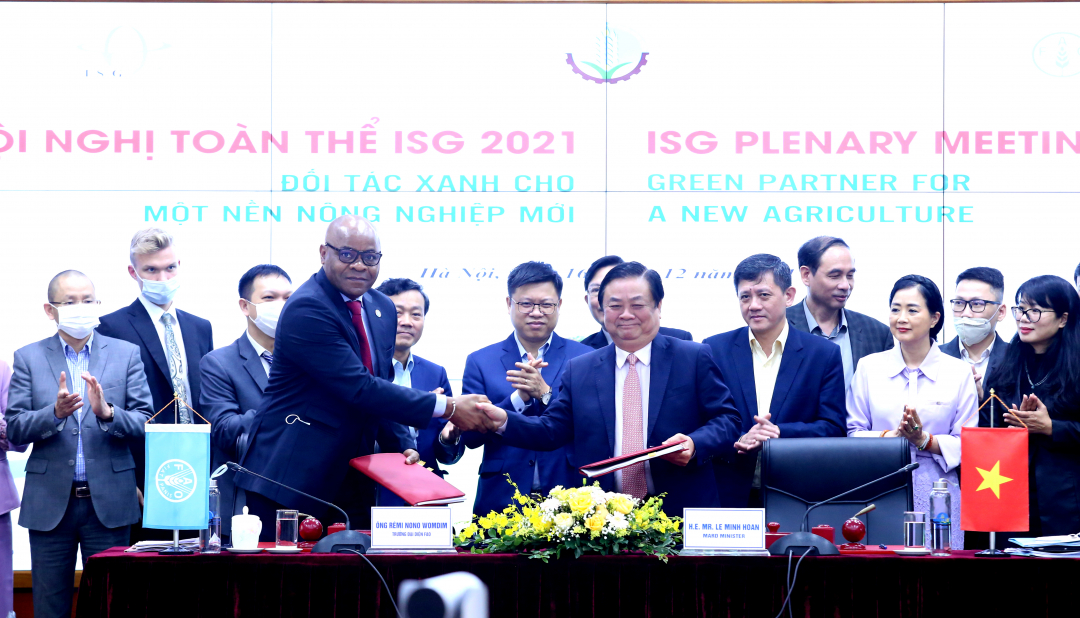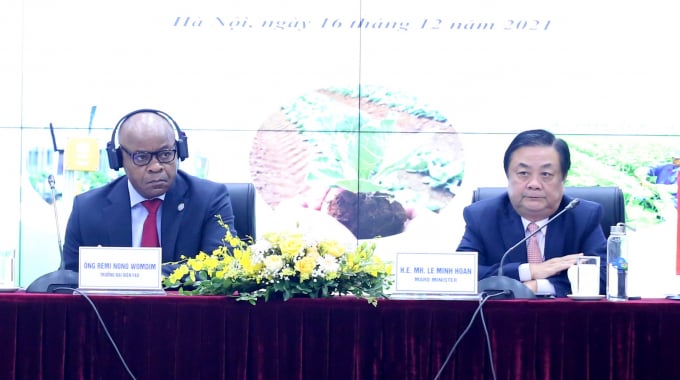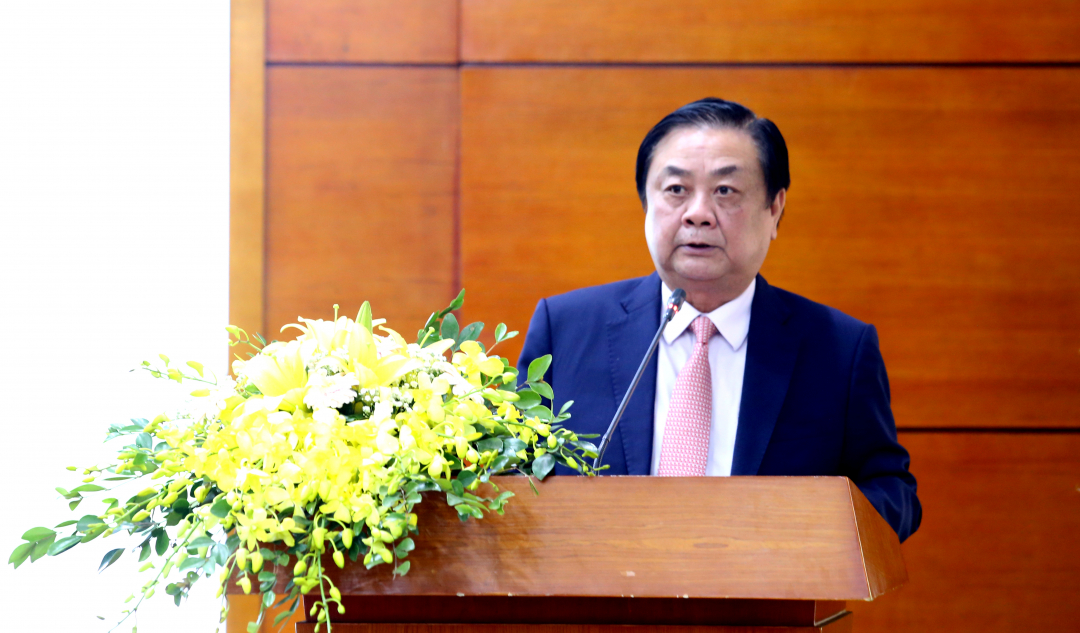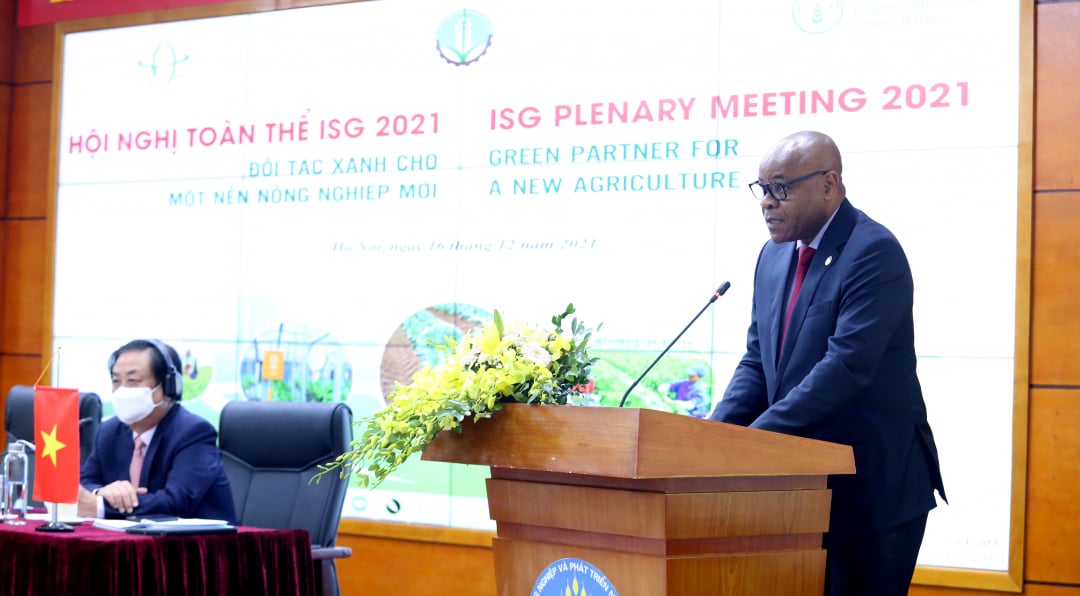November 26, 2025 | 11:37 GMT +7
November 26, 2025 | 11:37 GMT +7
Hotline: 0913.378.918
November 26, 2025 | 11:37 GMT +7
Hotline: 0913.378.918

Mr. Rémi Nono Womdim, Chief Representative of FAO Vietnam, and MARD Minister Le Minh Hoan sign a framework program for Vietnam - FAO cooperation in the period 2022-2026. Photo: Minh Phuc.
In the morning of December 16, the Ministry of Agriculture and Rural Development (MARD) and the United Nations Food and Agriculture Organization (FAO) held a plenary meeting on the International Support Program (ISG) themed "Green Partnership for a New Agriculture".
The conference was co-chaired by MARD Minister Le Minh Hoan and FAO Vietnam Chief Representative, Mr. Rémi Nono Womdim.
The ISG Plenary Meeting is a high-level policy dialogue forum held annually for the MARD and its partners including the international donor community and business groups to exchange and share their opinions on policies and priorities in promoting international cooperation, strengthening the coordination of resources to boost Vietnam's agricultural development towards sustainability and integration of "multi-values".

Mr. Rémi Nono Womdim, Chief Representative of the FAO Vietnam and MARD Minister Le Minh Hoan. Photo: Minh Phuc.
Currently, the agriculture and rural development sector is actively completing its Strategy for Agriculture and Rural Development in the period 2021-2030, with a vision to 2050, and Vietnam's National Action Plan on food and foodstuff sustainable system for the period 2021-2030 to realize the goal of creating an image for Vietnam's agriculture as a "transparent - responsible - sustainable" food and foodstuff supplier. The goal has been confirmed by the Party and State leaders leads to the international community.
The agricultural and rural development strategy 2021-2030, with a vision to 2050, is built based on three pillars: "Ecological agriculture", "Modern countryside" and "Smart farmers".
The National Action Plan for Transitioning to a Transparent, Responsible, and Sustainable Food System in Vietnam for the period 2021-2030 is built on the basis of 5 action roadmaps presented at the Conference. The United Nations Food System (LTTP) summit just held in September 2021 includes topics of Ensuring everyone access safe and nutritious food; Transition to sustainable consumption; Promote sustainable production; Build competitive, inclusive, and equitable value chains and Enhance resilience to vulnerability, shock, and stress.
Minister Le Minh Hoan said that to transform into green agriculture, the sector cannot “stand-alone”, it needs sharing, companionship, and support of other ministries, central agencies, and localities, especially those of the international community to build a green partner for a new agriculture.

MARD Minister Le Minh Hoan. Photo: Minh Phuc.
Simultaneously, the Minister affirmed, with "innovative thinking" and "acting together", Vietnam's agriculture and rural development sector will realize the aspiration of an ecological, advanced, integrated multi-valued agriculture, harmoniously combining indigenous resources, cultural identity, social trust with science and technology, innovation and digital transformation so that to become "a measurer of the country’s sustainability".
Meanwhile, Mr. Rémi Nono Womdim emphasized political commitments and strategic partnerships with stakeholders were key factors for transforming into green and low-carbon food systems.”

Mr. Rémi Nono Womdim, Chief Representative of FAO Vietnam speaks at the conference. Photo: Minh Phuc.
For many years, FAO has always accompanied and supported policy changes in Vietnam's agriculture and absolutely believes that with the openness and willingness to listen to the opinions of MARD’s stakeholders, all strategies and plans, will reap good results as desired after completing and promulgating.
FAO will continue to support the transformation of food systems towards a more efficient, inclusive, adaptive, and sustainable direction leaving no Vietnamese behind.
Also at the ISG Plenary Meeting 2021, the delegates witnessed Minister Le Minh Hoan and FAO Representative Rémi Nono Womdim sign the framework of the Vietnam - FAO cooperation program for the period 2022-2026.
This cooperation framework represents a high commitment to continue cooperation between the MARD and FAO in promoting sustainable agriculture and rural development in Vietnam towards a green, ecological, and integrated multi-diversity value direction.
The ISG Conference 2021 is an important event for MARD to widely consult international partners with the aim to complete its Strategy for Agriculture and Rural Development in the 2021-2030 period, a vision to 2050, and National Action Plan for the Transformation into a Transparent, Responsible and Sustainable Food System in Vietnam for the period 2021-2030.
Translated by Linh Nguyen

(VAN) After the institutional merger, Da Nang possesses significant forest-carbon reserves and is proactively engaging in the carbon market, creating a new revenue stream.

(VAN) An Giang strengthens communication against IUU fishing, increases inspections and sanctions, and is determined to remove the EC’s “yellow card” while developing a sustainable fisheries sector.

(VAN) As green transition becomes a global trajectory, Viet Nam’s biggest challenge is not only technology and models, but how to ensure that capital flows reach the right beneficiaries.

(VAN) The Ministry of Agriculture and Environment must spearhead the construction of green governance, spanning decision-making processes and investment standards to policy evaluation mechanisms.

(VAN) The Agriculture and Environment sector of Khanh Hoa has achieved numerous milestones over the past 80 years, contributing significantly to the goal of establishing the province as a centrally governed city by 2030.

(VAN) Viet Nam is entering the pivotal period of 2025-2030, moving toward the formulation of the Remote Sensing Law, which will establish a legal foundation for the development of national digital data.

(VAN) The agricultural sector is finalizing the strategic framework for emission reduction, setting the goal of sharply cutting methane and 403.7 million tons of CO2 equivalent and moving toward Net Zero by 2050.